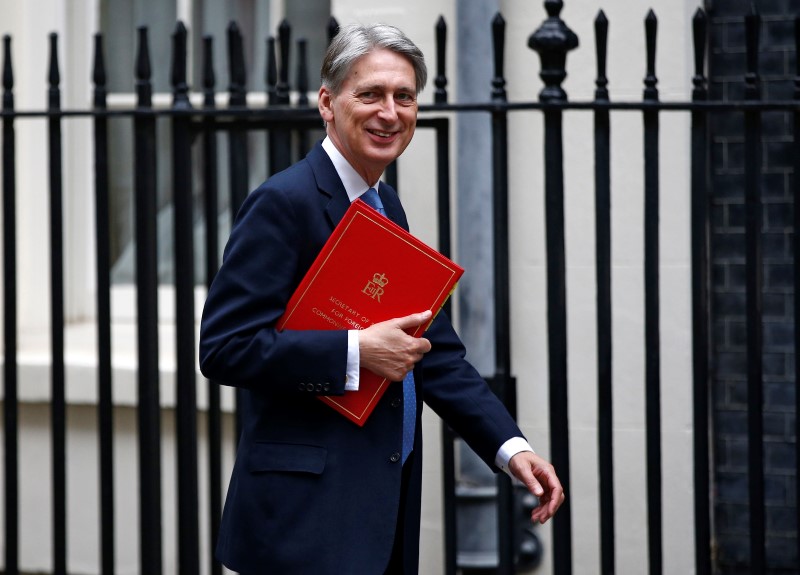(Bloomberg) -- Chancellor of the Exchequer Philip Hammond delivered on a number of key demands from British companies in his budget statement, and won mostly approval from the U.K.’s biggest business lobbies.
“This was a rock-solid budget, bringing more treats than tricks for business,” Carolyn Fairbairn, director-general of the Confederation of British Industry, said in reference to Halloween being days away. Stephen Phipson, head of the EEF manufacturing lobby, called it a “practical, realistic statement.”
Still, there were areas that fell short. While the chancellor said he was “confident” the government would secure a Brexit agreement with the European Union that would yield a “deal dividend,” he still couldn’t provide the certainty British businesses have been calling for.
“The final and most important piece of the jigsaw is a comprehensive Brexit deal that gives firms the clarity and precision they need,” said British Chambers of Commerce Director-General Adam Marshall.
Businesses are also wary of a new digital services tax aimed at social media platforms, online market places and search engines -- a thinly-veiled way of getting companies like Google (NASDAQ:GOOGL) and Facebook (NASDAQ:FB) to pay more U.K. tax. “The chancellor must proceed with extreme caution here,” said Stephen Martin at the Institute of Directors.
Below we look at how the budget compared to a list of demands from the CBI, the EEF, the IoD, the BCC and the Federation of Small Businesses.
1) Change the Apprenticeship Levy
All five lobby groups wanted action here, and they got it.
The program is supposed to help fill skills gaps, yet businesses say it doesn’t work as intended. Under the program, larger employers pay the levy, which they can then recoup to spend on training apprentices. They can transfer as much as 10 percent of their payment to companies in their own supply chain, while smaller employers who don’t pay the levy can still access funds by contributing a 10 percent so-called co-investment toward training costs.
Hammond agreed to demands to cut the co-investment contribution to 5 percent, and announced 80 million pounds ($102 million) of funding to help small companies hire apprentices.
2) Reform Business Rates
Four of the five lobby groups requested changes to business rates -- taxes on offices, shops and factories based on the value of the premises. Hammond said he will change the way the rates are calculated from 2021, and will immediately cut rates for smaller businesses by a third.
3) Spur Business Investment
Another demand was for measures to spur business investment, including by raising the Annual Investment Allowance -- a tax-free amount businesses can spend on things like buildings and machinery. Bloomberg reported earlier this month that this was something the Treasury was actively looking at, and Hammond duly delivered, announcing a two-year boost to the allowance to 1 million pounds from 200,000 pounds.
“This will be a huge shot in the arm for businesses across the country, giving many thousands of firms renewed confidence to invest and grow,” said Marshall of the BCC.
4) Infrastructure Investment
Businesses called for more investment in transport and digital infrastructure and again, Hammond was able to offer them something. He allocated 200 million pounds to roll out fiber broadband in rural locations, and promised 420 million pounds to tackle potholes, bridge repairs and other minor works.
5) Brexit Planning
The IoD and CBI wanted help for businesses to plan for Brexit. The former called for the government to issue vouchers worth as much as 3,000 pounds to small- and medium-sized companies to spend on lawyers and consultants; the latter suggested an online one-stop shop for businesses to get advice and information. Neither was forthcoming.
“Firms have to look at all possible scenarios and will be deeply disappointed to see no funds have been allocated to helping them map out potential outcomes,” said the IoD’s Martin.
6) Immigration
Businesses are worried about attracting the workers they need after Brexit, especially with unemployment near historic lows. The IoD and EEF had asked for the Immigration Skills Charge, which the government levies on companies that hire certain workers from outside the EU, to be frozen or scrapped. The EEF wanted a pledge not to extend the levy to EU workers after Brexit.
Hammond delivered on neither front.
7) Green Measures
The EEF had requested that Hammond should ensure the cost of carbon doesn’t overburden heavy manufacturers. It sought a freeze in the U.K.’s carbon price floor -- a minimum payment for every ton of carbon dioxide emitted, composed of the EU Emissions Trading System price and a supplementary charge set by the government.
While the chancellor didn’t mention carbon pricing in his speech, underlying Treasury documents showed a freeze for the 2020-21 tax year. And in the event Britain tumbles out of the EU without a deal next year, greenhouse-gas polluters may see their costs for emitting carbon cut in half.
There was disappointment from renewable energy groups, including the Solar Trade Association and the Renewable Energy Association, at the dearth of measures to promote solar and other green power.
